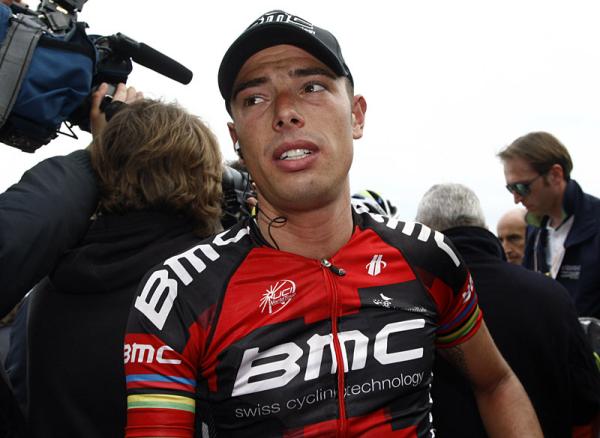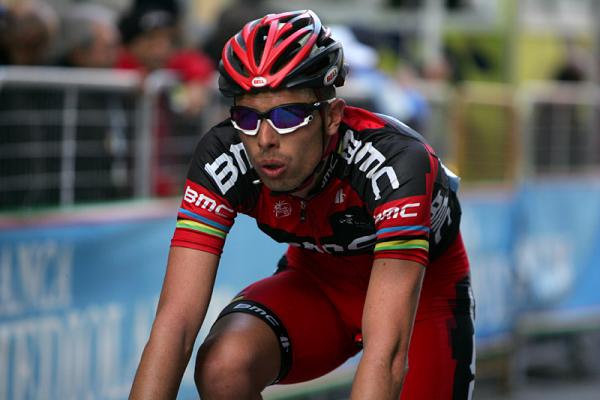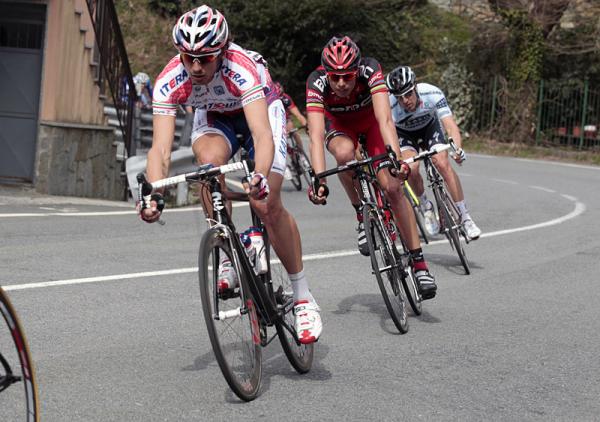Confident Ballan arrives in Belgium after strong Milan-San Remo 2011 showing
Italian views Cancellara as the danger man on the cobbles



Alessandro Ballan (BMC) arrived in Belgium on Tuesday ahead of the cobbled classics and the former world champion is confident that he is back to the kind of form that saw him win the Tour of Flanders in 2007. Ballan finished in 4th place at Saturday’s Milan-San Remo 2011, where he had ample opportunity to measure himself against his principal rivals for glory in the coming weeks.
“I’m very happy with my start to the season, because after two years with a lot of problems I’m back at the front in the finale of the important races that I like,” Ballan told Cyclingnews in Kortrijk. “Two second places and 4th in San Remo show that I’m back to being the rider I was in 2008, 2007 and 2006. The only thing missing is a win.”
Ballan contributed generously to one of the finest editions of Milan-San Remo in recent memory and he was particularly pleased with the way his BMC squad took the initiative when the peloton split on the Le Manie, with 90km still to go. Along with Omega Pharma-Lotto, Ballan and his cohorts provided much of the manpower in the front group.
His teammate Greg Van Avermaet then managed to slip clear in a four-man break on the descent of the Cipressa, and then attacked alone on the Poggio, but Ballan admitted that BMC would have been better served had Van Avermaet saved himself for the sprint and left Ballan himself to go on the offensive.
“Van Avermaet anticipated a little, perhaps it should have been the opposite: it would have been better if I had attacked and if Greg, being quicker in the sprint, had stayed in the wheels,” Ballan said. “We could have had a better placing, at least finished on the podium.
“Unfortunately, I think sometimes Van Avermaet is a little too impulsive. He always wants to anticipate, to attack. But being very quick like he is, he should have waited and aimed at the finishing sprint.”
However, Ballan was keen to praise Van Avermaet’s sharpness on the descent of the Cipressa. “He was good, because he saw the two French riders [FDJ’s Steve Chainel and Yoann Offredo] getting clear and he got on straight away,” Ballan noted. “Maybe with a few seconds more, he might have stayed clear until the end. He did a great race, as a protagonist, and that benefited me behind.”
The latest race content, interviews, features, reviews and expert buying guides, direct to your inbox!
Ballan himself suffered the misfortune of being caught behind Marco Marcato’s (Vacansoleil-DCM) crash on the descent of the Poggio, and after a frantic chase, he was unable to keep his powder dry for one last jump in the finale.
“If he hadn’t fallen, I certainly would have arrived down at the finish a little bit fresher because I used up a lot of energy getting back on,” he said. “Then in the finale when Cancellara attacked and Pozzato closed him down, I was flat out, I was really very tired. Maybe if I hadn’t made that effort, then I would have been able to attack and anticipate the sprint, but I didn’t have the legs.”
The Pozzato polemic
Ballan’s fellow Veneto native Filippo Pozzato (Katusha) drew the ire of Philippe Gilbert for his supposedly negative tactics in the finale of Milan-San Remo, but Ballan explained that the closing stages of a classic are always tense affairs, with so much at stake.
“It’s logical that when Cancellara or Gilbert attack you try to close them down immediately, because they are the kind of riders who could just keep going all the way to the finish,” he told Cyclingnews. “I certainly don’t think he just sat on Gilbert’s wheel to try and make him lose the race. After 300km, every rider who was out there in front wanted to win, and everybody played their hand.”
Ballan himself was more perplexed by Vincenzo Nibali and Liquigas-Cannondale’s tactics in the final 20km, and he was surprised that they didn’t look to set up Peter Sagan for the sprint.
“I didn’t really understand Liquigas’ tactics,” he said. “Sagan was coming back on behind and Nibali kept attacking. I would have looked to try and bring Sagan to the finish in a sprint.”
Cancellara the dangerman on the cobbles
As part of the very select eight-man group that disputed the sprint on the Lungomare Italo Calvino on Saturday, Ballan had a close-up view of a number of the men who will battle with him for supremacy in Belgium and northern France in the coming weeks. One man stood out above all others, last year’s classics king Fabian Cancellara (Leopard Trek).
“I thought Cancellara was really, really strong,” Ballan said. “We went over the Poggio together at a very high speed, then he attacked on the other side of the Poggio with a couple of kilometres to go and in the end at the sprint he was still able to come second, which shows that he really had energy to spare at the end.”
Gilbert and Pozzato are two of the other names that he expects to be in the mix in Flanders, while Tom Boonen (Quick Step) remains a threat in spite of his recent illness: “Tom Boonen was a little sub-par in San Remo, but I know he was sick before Tirreno-Adriatico so he’ll improve.”
Ballan was surprised by Garmin-Cervélo’s failure to make an impact on the race, in spite of the mitigating circumstances of Thor Hushovd’s crash.
“I expected more from Garmin,” he said. “I thought Heinrich Haussler would have more of a role in the finale but in the last 20km he was dropped. I thought he would be very dangerous, and honestly, I was worrying about him more than Matt Goss.”
Indeed, the Australian is another rider that Ballan reckons might well have his say in Gent-Wevelgem at the weekend after his San Remo triumph. “I knew that Goss was a fine rider, but having gone so hard up the Poggio I didn’t think he’d be able to stay up there,” he admitted. “But instead he showed that he is really very well able to cope both with the distance and those kinds of routes.”
On Wednesday, Ballan begins his Belgian campaign with the Dwars Door Vlaanderen, a race he believes might suit his teammate Van Avermaet’s characteristics. For his part, he is looking to familiarise himself with riding on the cobbles again.
“It’s the first time that I’m riding in Waregem, but I saw the route,” he said. “I saw there’s the Kwaremont and Paterberg 30km from the end, so that’s still a bit far for the finish. The important thing is to get confidence on the pave and try to stay at the front. Then in the finale we’ll see.
“It’s logical that the team will work for Van Avermaet because he is fast and he’s also shown that he’s going very well. I’m happy to help him because he’s showing that he’s a great rider and above all a great guy.”

Barry Ryan was Head of Features at Cyclingnews. He has covered professional cycling since 2010, reporting from the Tour de France, Giro d’Italia and events from Argentina to Japan. His writing has appeared in The Independent, Procycling and Cycling Plus. He is the author of The Ascent: Sean Kelly, Stephen Roche and the Rise of Irish Cycling’s Golden Generation, published by Gill Books.